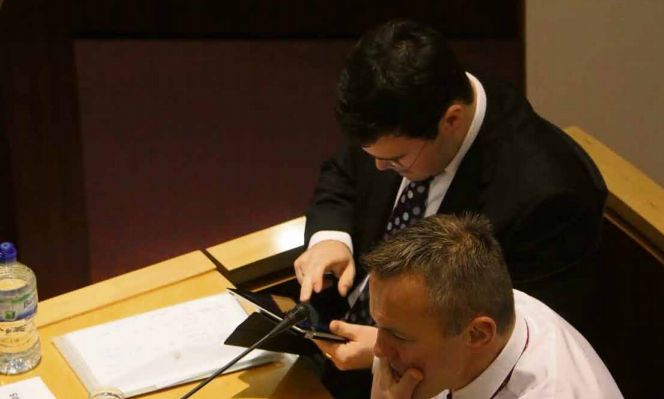News
COUNCIL IN CRISIS: A view from the floor

IT’S BEEN a week since Friday’s extraordinary council meeting and the disgusted reaction from the public and media has been monumental. The events that unfolded at County Hall, witnessed by so many, have drawn criticism: from national political heavyweights, to senior figures in the Welsh media. It’s quite pleasing to know that, for a change, every person in Pembrokeshire and their dog seems to be aware of what went on, and that’s owed to the absolutely brilliant new live-webcasting facility, which, given the subject matter, was a must-watch episode.
The meeting was arranged primarily to consider the damning public interest report issued on January 30th by the Wales Audit Office, which the statutory framework required to be held within a month of its publication. The meeting was unrelated to the ongoing police investigation into the report’s conclusions, which is being conducted by Gloucestershire Constabulary, and had no bearing on it either. In his report, Mr Anthony Barrett, assistant auditor general for Wales, found that the decision made in September 2011 by six senior councillors of the authority’s Senior Staff Committee to allow the highest paid officers the option to exit their pension scheme and receive cash sums in lieu of their pension contributions, was unlawful for a number of reasons.
The meeting started at 10am, opening with Mr Barrett’s brief presentation of his report, an outline of his four recommendations, and what was required of the council at the meeting. Because of the nature of the report and the fact that Mr Barrett recommended the tax-dodge scheme be scrapped, the chamber was purposely and unusually devoid of any senior officers, apart from Mr Laurence Harding, the Monitoring Officer: the only senior officer ineligible to take up the scheme, as he is in semi-retirement.
There might not have been any other senior officers on the scene, but to make up for the chief executive and his directors’ absence the council’s top external barrister was parachuted in from London. Mr Tim Kerr QC, an expert of UK renown in local government matters, among others, had been drafted by ‘the council’ to defend the scheme as soon as the auditor started making noises last year, and, using his legal advice, the council was unsuccessful in convincing Mr Barrett that there was nothing serious for him report on. The very inclusion of Mr Kerr – whose name rhymes with car – and his legitimacy at such a meeting was challenged right at the start by Cllr. Mike Evans. Mr Harding responded that Mr Kerr’s role was to advise the council on issues relating to the public interest report and also to advise on ‘possible disciplinary action’ in relation to the subsequent motion on the agenda to suspend the chief executive – more on that later.
As he was instructed by senior officers of the council to defend the scheme enshrined in their contracts, council-watchers will have been forgiven for expecting Mr Kerr to come out with an all-guns-blazing approach to debunk Mr Barrett’s report, line-by-line, in an attempt to persuade councillors to go against his recommendations. What he actually said, in calm and rather hushed tones, was that the Wales Audit Office and the council “had a very different understanding of the law,” but it was his advice that the council accepted Mr Barrett’s four recommendations.
They were: (1) to scrap the scheme and cease future payments (2) to address ‘procedural weaknesses’ if an attempt is made to reintroduce the scheme in future (3) to make sure any potential future payments are in accordance with the decision being made that no additional cost accrues to the authority, and (4) to make an appropriate disclosure in the council’s financial accounts before re-approving them.
Mr Kerr said the council should vote to accept these four recommendations: “…not because it is intrinsically unlawful for a local authority to adopt a pay policy which allows a senior officer to opt out of the Local Government Pension Scheme and receive the equivalent of the employer’s contributions as part of salary instead, not because there was any wrongdoing on behalf of the council members of the Senior Staff Committee; and not because it was wrong for any senior officer to attend that meeting.”
However he did accept that there were procedural issues outstanding, and the council failed to conduct an Equalities Impact Assessment, which would be required if such an avenue was pursued again in future, before concluding that the council “was not bound to sue its chief executive for the monies paid as he would be likely to have a defence of ‘change of position,’” before citing an early 1990s legal case to ward off any members who’d dare to think of clawing back the chief executive’s and another unnamed officer’s unlawful payments.
Mr Kerr did then go on to explain why he disagreed with Mr Barrett, line-by-line, but this was not in a particularly adversarial style, and seemed rather a moot point, given his advice to accept the four recommendations as-is. As Cllr. Mike Stoddart put it: “we haven’t done anything wrong, but we won’t do it again.”
What readers may not be aware of is that Cllr. Stoddart and I had taken part in a long-running chain of emails to the council’s legal department and Monitoring Officer in the days leading up to the meeting, challenging the decision that had been made to actively deny councillors their rights to see Mr Kerr’s full written advice which we thought had been provided last autumn.
Sheer bloody-minded resistance
All councillors were copied into the emails, in which the unmovable official line – or “sheer bloody-minded resistance”, as Mike puts it – held that councillors did have a ‘need-to-know’ the written legal advice, but that it “has been designated as Legally privileged as it contains information relating to another council and information that relates to possible formal legal action,” and “The right to legal privilege has not been waived.”
Our need to know the information, we were told, would be satisfied by Mr Kerr’s presence at the meeting, where “all Members will be able to ask counsel for clarification of advice received,” as well as a nine-page letter (included in the agenda report) sent to the WAO by the council, which was based on the QC’s ‘privileged’ full written advice.
This, clearly, wasn’t good enough, so the emails continued – and despite numerous attempts to point out our rights were being trampled over, and requests for the decision to be revisited, we were cast aside and provided with nothing more.
It wasn’t until Friday’s meeting when asked by Cllr. Michael Williams did we realise that Mr Kerr had actually provided two sets of written advice/opinion, in September and November 2013. These were both provided to Pembrokeshire and Carmarthenshire County Council after they had sought joint advice into the legality of their identical schemes, to keep costs down. How thoughtful! Cllr. Williams continued his line of inquiry, and there were gasps when our QC – paid for by you – revealed that, between them, these two sets of advice amounted to over 40 pages.
Following these revelations, members were on a roll. I asked the chairman if he would agree to a vote to allow members access to the advice, and he agreed – though obviously our rights to see the legal advice existed regardless of whether the vote had succeeded or failed. In the event, no vote was taken, or necessary, because Mr Kerr quite helpfully confirmed what right-thinking councillors and the public had thought all along – that he, as the provider of the written advice, was the one who could use ‘legal privilege’ to deny access to it by any person other than his instructing client, as he was bound by client confidentiality; but that the advice, once in the possession of the council, was the council’s to do with what it liked. Mr Kerr said: “it is not unknown for elected members to be shown confidential, privileged legal advice, provided by someone such as myself, in writing, under strict conditions of confidentiality,” and that was just what we wanted – and expected – to hear.
It might not come as a surprise that, in this case, the legal view of a top QC easily outweighed those of lowly councillors, but I would be doing a disservice to the public purse-string holders if I didn’t point out that I haven’t invoiced the authority for a single one of my numerous emails, though I can’t comment on Cllr. Stoddart because he has, among others, a law degree.
Where’s the legal advice
Mr Harding agreed during the meeting – confirmed numerous times on camera – to allow councillors access to Mr Kerr’s written advice, but as it was jointly sought and contains information relating to another authority, the bits relating to our Towy-side counterparts would need to be redacted beforehand. There is still some element of dispute over this arrangement, and that we weren’t allowed it before the meeting as requested, but it’s certainly a step in the right direction, albeit costly and long overdue.
After that was out of the way, ‘debate’ commenced over Mr Barrett’s report, and the way members had wilfully been kept in the dark by officers over the written legal advice. There were a number of excellent contributions, particularly from Cllrs. Bob Kilmister and Mike Evans
Brian Hall doesn’t like “bullying”
Cllr. Brian Hall sought to attribute the public furore over the pension payments scandal to the future political ambitions of the council’s second-youngest upstart, Cllr. Paul Miller; the leader of the council’s Labour group and the party’s parliamentary candidate for next year’s general election. Irony doesn’t come much funnier than Cllr. Hall’s claim that others had shown “cowardly and bullying” behaviour, either!
After council voted to accept the auditor’s four recommendations, Mr Barrett and his team left. You might have expected our learned QC to follow them out the door, but he stuck to his brief, and his seat, for the discussion of the next and final item on the agenda. This was the vote tabled by Cllr. Paul Miller, signed by nine councillors, myself included, that the chief executive should be suspended on full pay pending an investigation.
Immediately as the chairman moved on to this item, up stepped Crymych councillor and ruling party devotee, Keith Lewis, to introduce the dirtiest trick the council chamber has probably seen to date. It had all the classic hallmarks of a cooked-up ploy, though what Cllr. Lewis lacks in subtlety, he more than makes up in enthusiastic loyalty to his ‘independent’ party’s cause.
Cllr. Lewis told the chamber that he was very concerned that, prior to the meeting, he had been approached – as had all councillors – by two of the county’s newspapers who were canvassing councillors’ views on whether or not they supported calls for the council’s chief executive, Bryn Parry-Jones, to resign. Cllr. Lewis said he’d indicated his support for Mr Parry-Jones not to resign, and he now regretted these comments as he feared they constituted a predetermination of the issue. He said because he was a good boy, he didn’t want to risk breaching the code of conduct by staying in the room and voting, because the code requires councillors to have an open mind before a vote, so he was going to declare a prejudicial interest, and leave the meeting.
As he exited stage left, minus crocheted collars and frilly cuffs, this prearranged stunt had all the flourish you might expect of a west Wales touring production of the Royal Shakespeare Company.
Mr Kerr was wheeled in to assist at this point, just as if he was a councillor or an officer of the authority, to say that on the previous day, he had been “shown some photocopies of press cuttings” in which comments from some councillors, he felt, may have prejudged the matter by indicating their support for the growing calls for the chief executive to resign.

Control of the meeting: : Council Chairman Cllr. A Williams, Monitoring Officer
Laurence Harding and council barrister Tim Kerr QC look over press cuttings
Who showed the QC the press cuttings?
All I can say is that Mr Kerr QC must be entirely forthright, because a curious Cllr. Tessa Hodgson pointed out that ‘being shown’ these cuttings meant that somebody must have shown them to him. Mr Kerr corrected himself. The day before the meeting he had been picked up by the chairman’s limousine from Port Talbot railway station. He said it was there, in the back seat of his chauffeured charabanc, that he found an envelope with his name on, waiting for him.
Mr Kerr’s envelope – which he said was white, and not brown as some might like you to believe – was stuffed with documents including the agenda for the council meeting and the cuttings of press articles in which it had been suggested to him a number of councillors’ comments had indicated a predetermination.
After further prodding from Cllr. Mike Evans, sitting to my left in the chamber, it was revealed that the envelope and its contents had been prepared for Mr Kerr by Mr Harding, the authority’s Monitoring Officer, a statutory position of utmost neutrality, which: “has the specific duty to ensure that the Council, its Officers, and its Elected Councillors, maintain the highest standards of conduct in all they do.”
Cllr. Evans said this arrangement seemed very much a case of “here you are guv, you might want to have a look at this,” and at different times Mr Harding said that he had read the articles himself and that they had been brought to his attention by someone else.
When asked, he was unwilling to give their name because that was confidential. It was apparent that the stage-management of this shameless spectacle was going somewhat awry soon after Cllr. Lewis took his cue, but the plot-twist took a trenchant turn when it was revealed that Mr Kerr – if he was tasked to do so or not – had some pre-prepared work on the topic up his sleeve, ready to be shared with the sitting ducks.
Whether this prior-preparation was his own idea, or that of somebody else’s, we don’t know, but, having sifted through the newspaper cuttings, he said he had come up with a list of ten councillors whose remarks, he felt, indicated a closed mind and predetermination which stymied their participation in the meeting. Oh, and, of course, it was entirely up to councillors to choose for themselves to declare an interest and leave the meeting, or stay on and take the risk.
In clear view of the webcam, brandishing a photocopy of the newspaper cuttings during this performance was none other than cabinet member and deputy leader, Cllr. Rob Lewis. Readers unfamiliar with the Martletwy mastermind will recall that he was the ‘brains’ behind the ruling independent party’s election strategy going into both the 2008 and 2012 polls, and the serial author of his so-called ‘independent’ colleagues’ election literature, using council equipment, in clear breach of the councillors’ code of conduct. Ever curious, the council took a unanimous vote allowing Mr Kerr to read out the names of the ten councillors on his list, which were: Mike Stoddart, Viv Stoddart, Rod Bowen, Myles Pepper, Tessa Hodgson, me, Michael Williams, Rhys Sinnett, Guy Woodham and Paul Miller.
What was more the remarkable about the list was that it contained only the names of councillors who had indicated support for the chief executive to resign, and not those who had said he shouldn’t resign, who, using the same logic, would surely have been equally as guilty of predetermining the issue at hand.
Cllr. Keith Lewis played a part in this stunt. His speech and exit from the chamber, it appears obvious to me at least, was designed to mount pressure on those councillors who’d spoken out on behalf of their constituents in support of the chief executive’s resignation, to recuse themselves from the vote. All of which, apart from Cllr. Myles Pepper, were members from the opposition benches.
The second part of the theory being that if all those opposition members had left the chamber to join Cllr. Lewis in the corridor because of predetermination, the ruling party would have more than enough votes in the bag to overcome any rebels from among their own, and the vote to suspend the chief executive would fail.
If that was the theory, it didn’t work as planned, because following Cllr. Lewis’ principled departure, the opposition benches remained put. Some time later, Cllr. Lewis came sheepishly back, where he found a much livelier chamber than the one he had left, with riled opposition councillors asking questions of the QC and the Monitoring Officer, decrying the filthy tricks that had been engaged, before deciding whether they should leave the room themselves, or stay and risk a brush with the Ombudsman.
Cllr. Lewis’ buttocks had hardly re-imprinted themselves on his still-warm leatherette swivel chair, before he got back onto his feet and reeled off almost the exact same speech he’d given minutes earlier, though this time when he left the chamber, he was ultimately followed by all but seven opposition members – regardless of whether their names had been singled out – in disgust at the calculated and politically-motivated ambush that had ensued.
The meeting came to an abrupt end as Cllr. Baker – a co-signatory to the agenda item for the chief executive to be suspended – withdrew the motion, but not before he and Cllr. Evans spoke out against the dirty tricks, which Cllr. Evans described as ‘reprehensible,’ for many reasons including the apparent compromise of officers’ neutrality that had been evident in the events that had unfolded.
This stunt has raised all sorts of questions that aren’t going to go away easily. BBC Wales cameras and reporters remained throughout, and when watching their Friday evening bulletin I noticed the council leader, Cllr. Jamie Adams, was recorded following the meeting explaining that a number of councillors had “naïvely” predetermined the issue and left the chamber, so there was no vote on the suspension of the chief executive.
Whilst this ambush might have stopped us from representing our constituents’ views, it has certainly not changed them – indeed, it will only serve to strengthen them, and raise greater awareness of the disgusting antics of Pembrokeshire County Council, and the filthy politics espoused by some at the Kremlin on Cleddau.
As Cllr. Tony Brinsden said before retiring from the chamber: “I made comments to the press, I stand by them 100%.”
Reproduced by kind permission. The original of this article is available on www.jacobwilliams.com
News
Prince William faces diplomatic tightrope on first Saudi Arabia visit

Energy, trade and human rights concerns collide as UK deploys monarchy’s ‘soft power’
PRINCE WILLIAM will step into one of the most politically sensitive overseas trips of his public life this week as he travels to Saudi Arabia at the request of the UK Government.
Unlike recent royal visits to Estonia, Poland or South Africa, this tour carries significant diplomatic weight, placing the Prince of Wales at the centre of a complex balancing act between strengthening economic ties and confronting a deeply controversial human rights record.
Sources close to the Palace say William “didn’t flinch” when asked to go, viewing such duties as part of his responsibility as heir to the throne.
But Saudi Arabia presents challenges unlike almost anywhere else on the royal calendar.
A country in transition
The visit will focus on energy transition and young people, two areas the kingdom is promoting heavily as it attempts to diversify its oil-dependent economy.
In recent years Saudi Arabia has staged major sporting and cultural events, including Formula One races, international film festivals and high-profile entertainment shows. The country will also host the men’s football World Cup in 2034.
Officials argue this signals modernisation and openness.
Critics say it is “sportswashing” — using global events to distract from repression.
Human rights organisations including Amnesty International continue to raise concerns over restrictions on free speech, criminalisation of same-sex relationships and harsh penalties for dissent.
While reforms have allowed women to drive and increased participation in public life, significant legal and social limits remain.
Meeting a controversial leader
Central to the trip will be talks with Mohammed bin Salman, widely known as MBS, the kingdom’s de facto ruler.
The crown prince is credited with pushing economic reforms but remains internationally divisive.
A US intelligence report concluded he approved the 2018 killing of journalist Jamal Khashoggi inside the Saudi consulate in Istanbul — an allegation he denies and Saudi Arabia rejects.
Whether William raises such issues privately is unlikely to be disclosed. Kensington Palace does not comment on confidential conversations.
However, the prince will be briefed extensively by the Foreign Office and the British Embassy before any meetings.
Soft power diplomacy
Government insiders describe William as a key diplomatic asset.
One source said the monarchy acts as a “secret weapon”, able to open doors politicians sometimes cannot.
This form of so-called soft power has long been part of the Royal Family’s overseas role — building relationships first, leaving governments to handle the harder negotiations.
Dr Neil Quilliam of Chatham House says Saudi leaders value high-level recognition from Britain.
“Deploying Prince William sends a signal that the UK takes the relationship seriously,” he said.
Energy cooperation and investment are expected to dominate talks, particularly as Britain seeks new partners during the global shift away from fossil fuels.
Echoes of the past
The visit also reflects longstanding links between the two royal families.
King Charles III has travelled to Saudi Arabia numerous times over the decades and is said to maintain warm relations with senior figures there.
William is now expected to assume a more prominent global role as he prepares for future kingship.
A delicate balancing act
For many observers, images of handshakes between William and MBS will be uncomfortable.
Yet world leaders continue to engage with Riyadh, citing its strategic and economic importance.
The prince’s task is unlikely to involve grand statements. Instead, it will be quiet diplomacy — maintaining dialogue while representing British values.
It is a careful, sometimes uneasy role.
But it is one the monarchy has long performed: building bridges in places where politics alone struggles to tread.
Community
Ice rink campaign launched for Pembrokeshire

Survey underway as resident explores sites and funding for year-round skating facility
PLANS to bring a permanent ice skating rink to Pembrokeshire are gathering momentum after a local resident began talks with council officers and launched a public survey to test demand.

Jemma Davies, from Newgale, says the county is missing out on a major leisure attraction that could benefit families, schools and visitors while creating new jobs.
At present, the nearest full-time rink for Pembrokeshire residents is in Cardiff — a round trip of several hours — making regular skating sessions difficult for many families.
She believes a local facility could change that.
“I think it would give people something completely different to do here,” she said. “It’s exercise, it’s social, and it’s something children could take up after school instead of having to travel out of the county.”
Early talks with council
Jemma has already met officers from Pembrokeshire County Council’s sport and recreation department to discuss whether the idea could be viable.
She is also hoping to approach Sport Wales to explore possible funding streams and support.
To measure interest, she has set up an online questionnaire asking residents whether they would use an ice rink and how far they would be willing to travel.
She said early responses have been positive, with families, young people and skating enthusiasts backing the idea.
Reusing empty buildings
Rather than constructing a new arena, Jemma is investigating whether vacant premises could be converted, reducing costs.
Potential options include a former retail unit in Haverfordwest or a large hangar-style building near existing leisure attractions.
She said: “If we can reuse a building that’s already there, it keeps the costs down and brings life back into empty spaces at the same time.”
As part of her research, she plans to visit Vindico Arena to better understand the practicalities of running a rink.
More than just skating
Beyond public sessions, she believes a rink could host school trips, birthday parties, events and competitions, while encouraging young people to take up winter sports.
“Pembrokeshire has produced plenty of sporting talent over the years,” she said. “There’s no reason we couldn’t develop figure skaters or ice hockey players here too.”
Residents who want to share their views can complete the online survey.
Cover image:
Jemma Davies: Hopes to bring a permanent ice rink to Pembrokeshire (Pic: Supplied).
Cymraeg
Moonpig’s Welsh fail still on sale as mistranslated St David’s Day card sparks laughs

A GREETING card meant to celebrate St David’s Day has become an accidental comedy hit after shoppers spotted its Welsh message makes absolutely no sense – and, even better, it is still on sale.
The card, sold by online retailer Moonpig, reads: “Hapus Dewi Sant Dydd.”
Unfortunately for the designers, that translates back into something closer to “Happy David Saint Day” or “Day Saint David Happy” rather than the correct Welsh phrase, “Dydd Dewi Sant Hapus.”
In other words, the words are right – just in completely the wrong order.
The mistake was first highlighted by Nation.Cymru, prompting plenty of amusement online, with some joking it looked like the result of a lazy copy-and-paste from an automatic translator.
The Herald decided to check for itself.
And yes – as of today – the card is still live and available to buy on Moonpig’s website.
Customers can personalise it and add it to their basket just like any other design, with no sign the message has been corrected.
One reader joked: “It’s like they put the words in a hat and picked them out at random.”
Another described it as “peak AI Welsh”.
For Welsh speakers, the error is immediately obvious. Welsh sentence structure differs from English, so simply translating each word individually rarely works. It’s the linguistic equivalent of writing “Birthday happy you” on a cake.
There was also online chatter that the dragon artwork may be facing the wrong direction – though by that point, the language had already stolen the show.
With St David’s Day cards meant to celebrate Welsh culture, the gaffe feels particularly ironic.
Still, if you fancy a collector’s item or a bit of office wall décor, you might want to be quick. Once someone at Moonpig finally runs it past an actual Welsh person, this one could quietly disappear.
Photo caption: The mistranslated St David’s Day card still available for sale on the Moonpig website (Pic: Moonpig).
-

 Health3 days ago
Health3 days agoHealth board targets rise in steroid and gym drug use across west Wales
-

 Crime4 days ago
Crime4 days agoSex offender jailed after living off grid in Pembrokeshire and refusing to register
-

 News6 days ago
News6 days agoPrincess of Wales visits historic Pembrokeshire woollen mill
-

 Crime3 days ago
Crime3 days agoTeacher injured and teenager arrested for attempted murder at Milford Haven School
-

 Crime5 days ago
Crime5 days agoHakin man’s appeal delayed again as Crown Court seeks guidance on insurance law
-

 Crime6 days ago
Crime6 days agoArrest made after Carmarthen park stabbing investigation
-

 Crime6 days ago
Crime6 days agoMan guilty of threatening to kill Herald editor
-

 Business2 days ago
Business2 days agoSix-figure negligence victory leaves retired builder trapped in divorce limbo




























